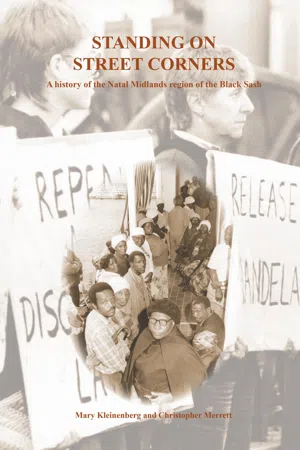
Kleinenberg: Standing on Street Corners
A history of the Natal Midlands region of the Black Sash
- 314 pages
- English
- PDF
- Available on iOS & Android
Kleinenberg: Standing on Street Corners
A history of the Natal Midlands region of the Black Sash
About this book
Nelson Mandela called the Black Sash, founded in May 1955 to contest legislation that removed coloured South Africans from the common voters' roll in the Cape, the 'conscience of white South Africa'. Adopting a radical critique of the national condition, Sash maintained high-profile protest against iniquitous apartheid legislation through the darkest hours of recent South African history. It also ran advice offices that assisted those disempowered by racist legislation and used the information gathered to support its political campaigns. This book chronicles the history of the Natal Midlands branch based in Pietermaritzburg. What was the relevance and legacy of the Black Sash, the women's anti-apartheid organisation, and what did this mean to its members? This book looks specifically at the Natal Midlands (Pietermaritzburg) region and the distinctiveness of its contribution. Like other regions it supported the liberation struggle through public protest and educational campaigns aimed at exposing iniquitous apartheid legislation. In a police state this required considerable determination and courage. During the darkest hours Natal Midlands Sash kept alive hope for universal civil rights in a democratic South Africa. The Pietermaritzburg Advice Office became one of the country's busiest, specialising in old age pension and disability grant issues. Knowledge painstakingly gathered about life for black South Africans was fed back into Sash's political and information campaigns while Natal Midlands produced several significant publications. One of the smaller branches, it punched above its weight. Whether Sash was a political pressure group of women, or a women's organisation challenging patriarchy, it generated lively debate. Environmental issues were also accorded a high priority. Fifteen interviews show that involvement in Sash was a life-enhancing experience for many members who have looked back with pride and honour at their part in the anti-apartheid movement from 1955 to 1994.
Frequently asked questions
- Essential is ideal for learners and professionals who enjoy exploring a wide range of subjects. Access the Essential Library with 800,000+ trusted titles and best-sellers across business, personal growth, and the humanities. Includes unlimited reading time and Standard Read Aloud voice.
- Complete: Perfect for advanced learners and researchers needing full, unrestricted access. Unlock 1.4M+ books across hundreds of subjects, including academic and specialized titles. The Complete Plan also includes advanced features like Premium Read Aloud and Research Assistant.
Please note we cannot support devices running on iOS 13 and Android 7 or earlier. Learn more about using the app.
Information
Table of contents
- Cover
- Title page
- Copyright page
- Dedication
- Contents
- ABBREVIATIONS AND ACRONYMS
- PREFACE
- FOREWORD
- 1. THE CONSCIENCE OF WHITE SOUTH AFRICA
- 2. WOMEN OF COURAGE: THE FIRST DECADE, 1955-1964
- 3. FINDING A FOCUS: THE SECOND DECADE, 1965-1974
- 4. THE YEARS OF UPRISING: THE THIRD DECADE 1975-1984
- 5. INTENSIFIED OPPRESSION: THE FOURTH DECADE, 1985-1994, PART 1
- 6. FINAL STAGES: THE FOURTH DECADE, 1985-1994, PART 2
- 7. SERVING THE PEOPLE: THE ADVICE OFFICE, 1975-1983
- 8. IN A STATE OF EMERGENCY: THE ADVICE OFFICE, 1984-1989
- 9. MOVING TOWARDS LIBERATION: THE ADVICE OFFICE, 1990-1994
- 10. CRUEL BEYOND DESCRIPTION: OLD AGE PENSIONS AND DISABILITY GRANTS
- 11. IN RETROSPECT: CONCLUSIONS AND OVERVIEW
- APPENDIX. Members of the Natal Midlands Black Sash
- INTERVIEWS AND INTERVIEWERS
- BIBLIOGRAPHY
- INDEX
- Back cover